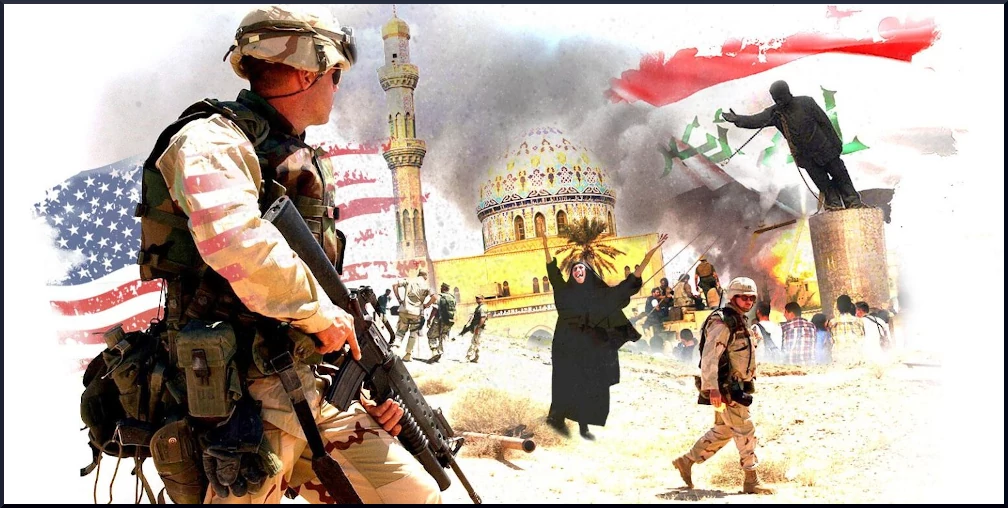by Steven Sahiounie, published on Mideast Discourse, March 23, 2023
The 20th anniversary of the US attack on Iraq for regime change coincides with the 12th anniversary of the US attack on Syria for regime change. March 2003 and March 2011 have a great deal in common, but that is not where the story begins.
The destruction of two nations, sitting side by side in the Middle East, began in 1996 with the strategy paper called “A Clean Break”, written by the man known as “The Architect of the Iraq War”.
“A Clean Break” was authored in part by Richard T. Perle, an American Jew from New York. Being born a Jew is not paramount to this story, but being an Israeli agent is. There should be a test when working on sensitive and top-secret plans for the US, that your allegiance is sworn to the US and no other country on earth. Perle was an American, but his allegiance lay elsewhere.
Perle delivered the paper to Benjamin Netanyahu, who had just been elected as Prime Minister of Israel. The paper presents the reasons for the US to attack and destroy Iraq and Syria. After President Bill Clinton took office, the paper was presented to him for action, but he declined. But, by the time of the 9/11 bombing of the WTC in NYC in 2001, the time was ripe to dust off the paper and Perle and his associates found President George W. Bush a willing partner.
Perle was the chairman of the Defense Policy Board, which was responsible for developing reasons for the US to attack other countries. The Pentagon does not develop policy, they simply are asked to report if a planned attack can be carried out successfully, or not. There is an old saying, “A soldier’s job is not to question why, a soldier’s job is to do or die”. Wars and attacks by the US cannot be blamed on the Pentagon, that blame must rest on the Oval Office, the State Department, the CIA, and the Defense Policy Board.
The 9/11 attack was carried out on the orders of Osama bin Laden, a Saudi national living in Afghanistan, and a leader of Al Qaeda, a terrorist group following the political ideology of Radical Islam, which is the same ideology as the Muslim Brotherhood, with hundreds of followers in the US.
The trick was how could the Bush administration connect Al Qaeda to Saddam Hussein, the leader of Iraq? The director of the CIA, George Tenet, repeatedly told Bush that there was no connection.
The second strategy of the Bush administration, was to build the case for invading Iraq based on Saddam Hussein having “Weapons of Mass Destruction” (WMD). The CIA was able to support that premise, not based on any facts, but based on the idea that Hussein might have WMD. When Tenet was asked about the WMD, he replied “We will find it when we get there.” That proved to be wishful thinking, as no WMDs were ever found by thousands of armed and highly skilled US soldiers who combed every nook and cranny in Iraq, for years.
So how did the US public and Congress come to believe the Bush administration’s lies? That was accomplished by the US mainstream media. The Bush administration spoon-fed false information to key journalists in the most reputable media outlets. The journalists were unable to personally verify the information on WMD, and they refused to reveal their sources who were the highest-ranking officials in the US government. Without the complicity of the media, the case for going to war in Iraq could never have been believed.
The events leading up to the first day of the bombing in Baghdad were unfolding so rapidly, that the ‘red flags’ of doubt were overlooked. Hans Blix was returning to his hotel in Baghdad when Bush announced to the world on TV that he would order the beginning of the bombing in 24 hours. Blix was blindsided when confronted by a microphone thrust in his face at the entrance of the hotel. At first, he didn’t believe the Bush order, and reiterated the results of his visits to numerous sites in Iraq, that Hussein had no WMD, they had been destroyed previously.
But, that never stopped the bombing from commencing on time. While the bombs were falling across Baghdad, Blix was back in NYC delivering his detailed report to Ban Ki-Moon, UN Secretary-General, which made the case that the Bush attack was based on a lie. All of this was covered in the media, but it was too late to stop the war machine.
The US was not alone. The UK and many of the NATO allies signed up for the Bush war on Iraq. All of them bear responsibility for their participation in an unjustified war that cost millions of lives. The US coalition partners blame their decision to participate on the fact they believed in US intelligence, and they believed in the lies. Another factor in their decision to follow the US lead was the fact that the US had been the sole ‘Super Power’. Those days are over, as the international community recognizes the new multi-polar world.
When Perle penned “A Clean Break” in 1996 for the leader of Israel, the attack on Syria was included, sort of a ‘2 for 1’ idea. Take out both Iraq and Syria at the same time, and Israel will be a safer place. Once Donald Rumsfeld became involved in planning the 2003 attack on Iraq, he counseled against including Syria. His decision was based on knowing two countries’ destruction is too big of a goal to be accomplished. He decided to focus on destroying Iraq only.
Syria was not attacked, and the war next door did not spill over the border. Syria accepted 2 million Iraqi refugees, and Angelina Jolie and Brad Pitt came to Damascus in 2009 and met President Assad because of his open-door Iraqi refugee policy.
The plans to destroy Syria began in the 1996 paper by Perle, and by March 2011 the President Obama administration had already started on their plans to create a ‘new Middle East’ and Obama utilized NATO to assist in the attack, invasion, and occupation of Libya. The US-NATO attack on Libya was the precursor to the attack on Syria which used Syrian followers of the outlawed Muslim Brotherhood and later were replaced by international terrorists following Radical Islam, such as Al Qaeda and finally ISIS.
Today, Iraq lies destroyed. It has never been reconstructed. Large areas still have no water, electricity, or medical care. The infrastructure of Iraq is broken. The Iraqi constitution was drafted by the invaders and has set the parliament up as a sectarian and ethnic quota system. In the US, it would be unthinkable to base elected offices on religion or ethnicity, but it was the US invaders who developed the Iraqi constitution which has locked the country into an unworkable system of corruption based on who your parents were, and where did they live. The US also insisted the Iraqi form of government be a Parliamentary system, which has kept the country locked into chaos as there is no central leader who can get things done, unlike the US Presidential system.
Syria resisted the US-NATO attack and the people fought back. Now, after 12 years there exists a possibility that brighter days are ahead for the Syrian people and the hope of reconstruction. In Iraq, there is also hope that the suffering they endured at the hands of brutal invaders, who committed atrocities against civilians, can be relegated to the pages of history, and a new chapter in security and prosperity can begin.
Steven Sahiounie is a two-time winner of the Serena Shim Award for Uncompromised Integrity in Journalism.
 Syria Support Movement solidarity with the Syrian people
Syria Support Movement solidarity with the Syrian people





